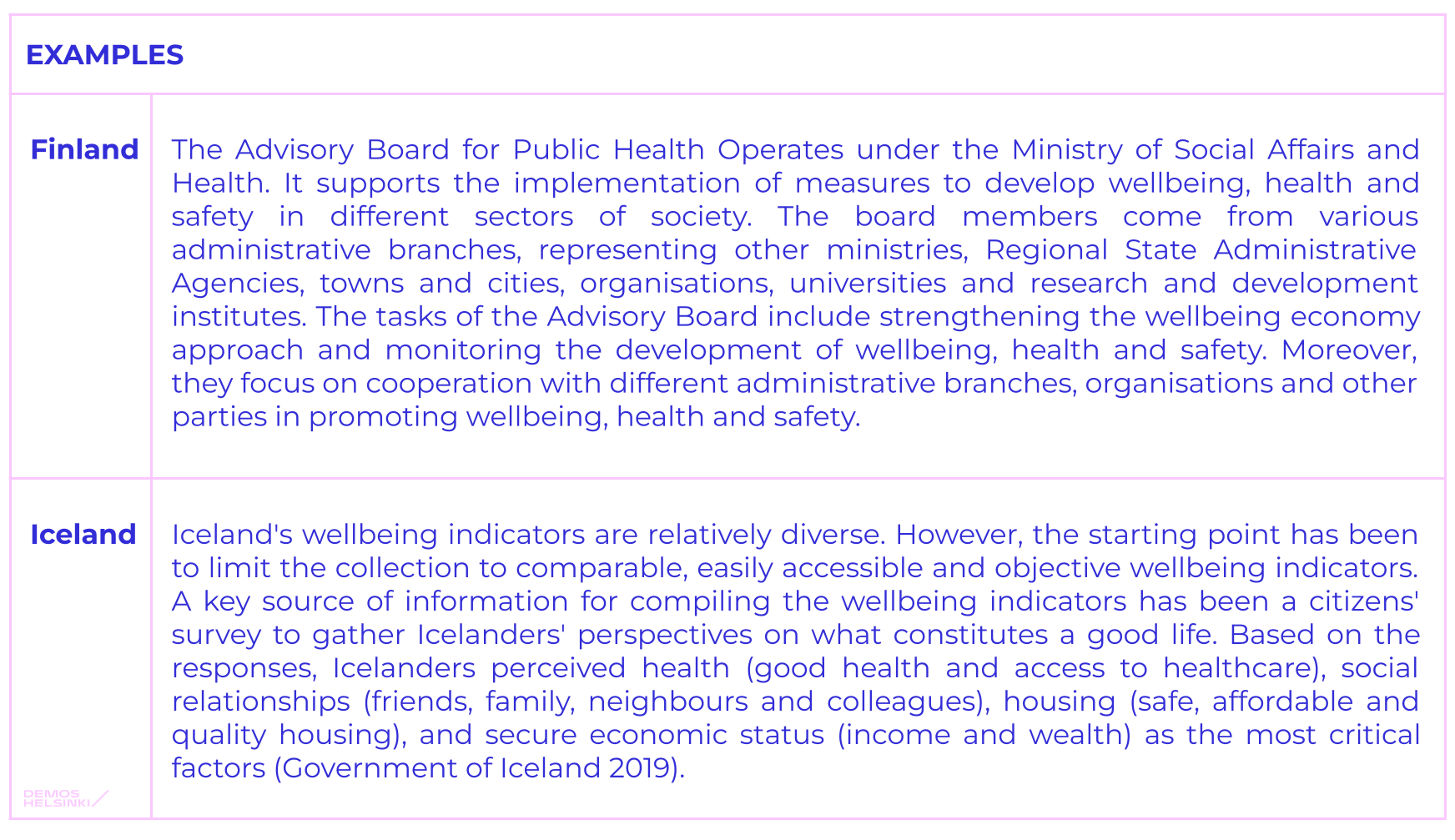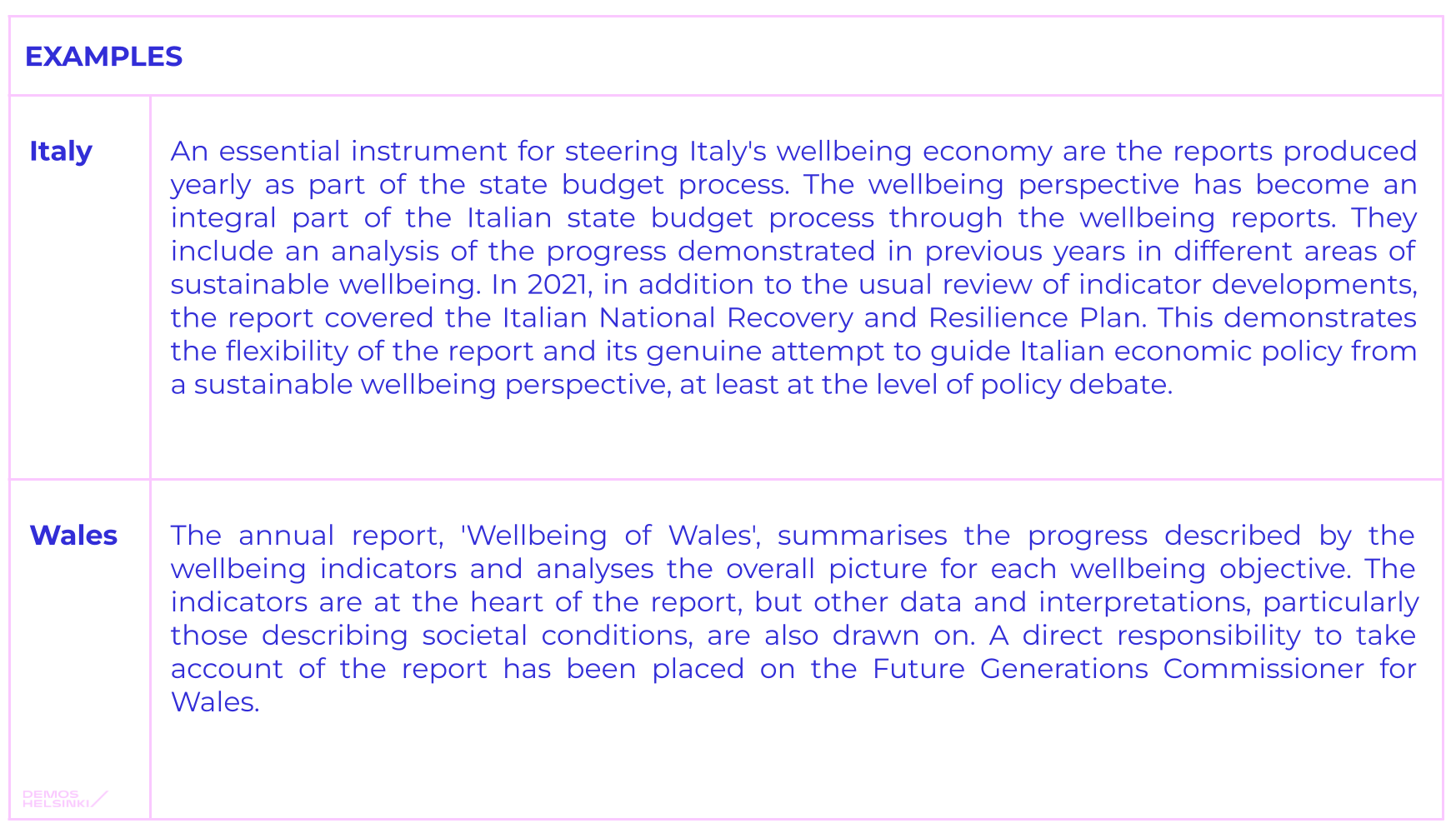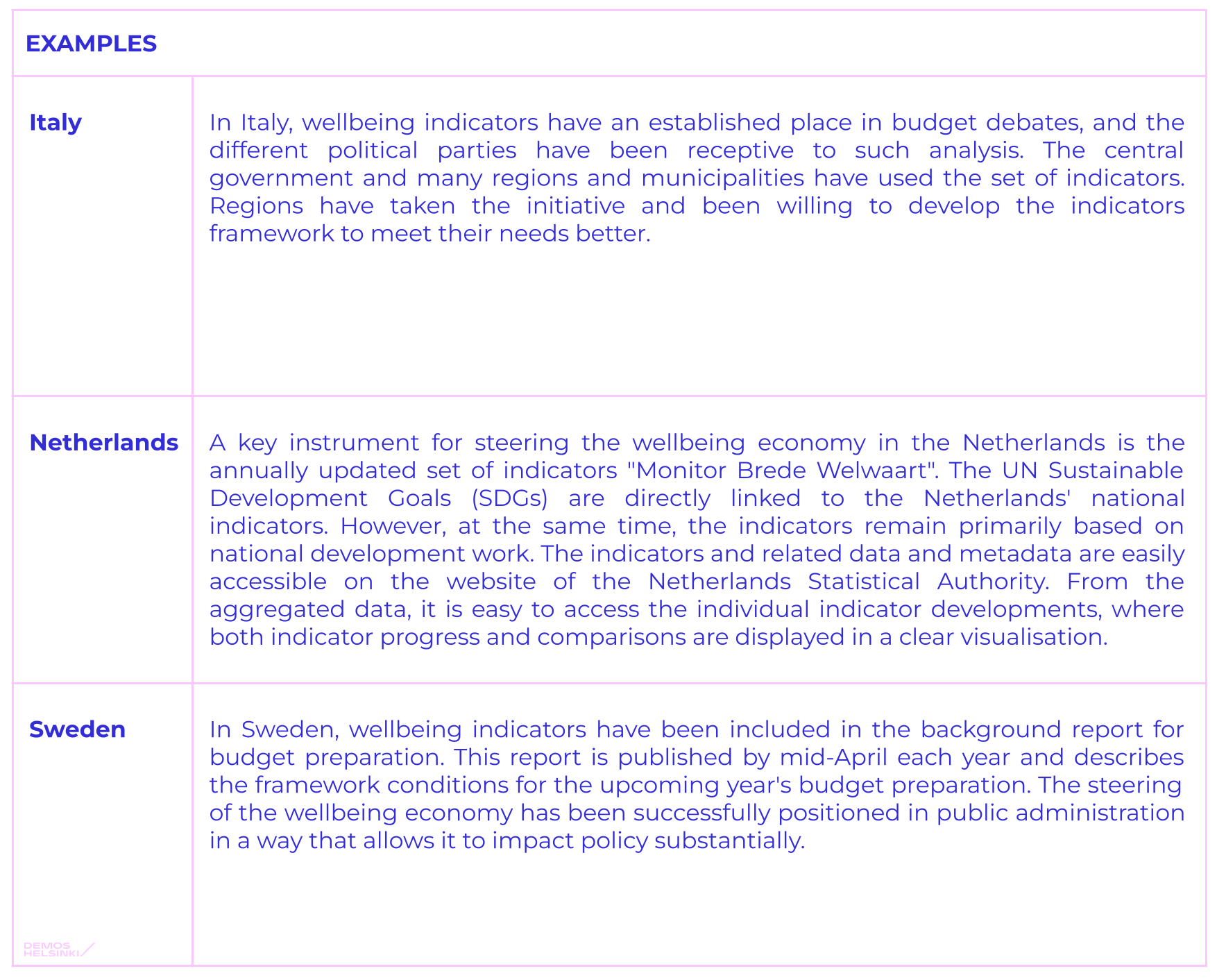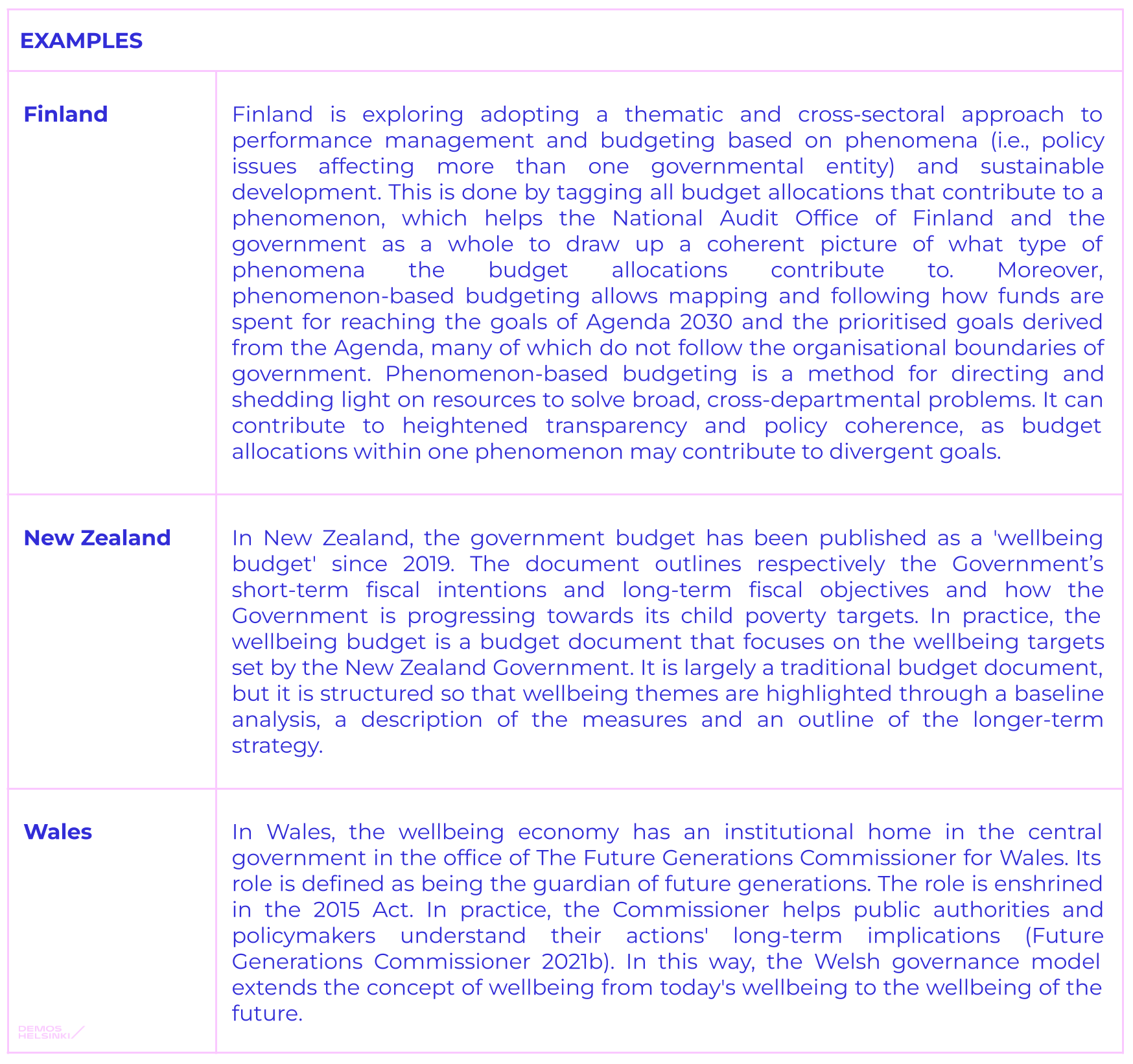The wellbeing economy offers a new framework for governance, with wellbeing as the core objective for policy. Despite its potential, governments struggle to integrate wellbeing into governance effectively. Demos Helsinki’s work identifies key principles – participation, evidence, measurement, and long-term investments – to bridge the gap between purpose and practice, shaping a governance framework that places human and planetary wellbeing at the heart of economic strategy.
Demos Helsinki, now a member of the Wellbeing Economy Alliance, proposes that the wellbeing economy has the potential to become a new guiding framework for governance. If increasing wellbeing becomes a broad objective for policymaking, it can create alignment and coherence in planning, decision-making and strategy for economic policy and beyond.
Even the best individual policies or standalone structures will not lead to their intended outcomes if paired with obsolete ways of governance.
Building our economies around the core objective of human and planetary wellbeing is no exception. While the promise of a wellbeing economy is convening policymakers across the world — and many governments pursue the integration of “wellbeing economy” in their programmatic strategies — there is still a missing link between purpose and practice: governance.
Why do governments struggle to integrate wellbeing as a core objective for (economic) policymaking? Through Demos Helsinki’s long history of examining the wellbeing economy and its application in Finland and internationally, we find that the wellbeing economy, while growing in visibility, remains detached from governance and economic steering. It is mostly pursued through individual policies or ministries. As a result, the most prominent challenge that affects the rollout of programmatic strategies that primarily promote wellbeing is not the absence of the right policies but the absence of an all-encompassing governance framework.
Why governance? Our experience in Finland
Since the fall of 2019, the Finnish government has made an active effort to pursue a wellbeing economy. In February 2023, The Finnish government published its National Action Plan for the Economy of Wellbeing. It includes five recommendations for promoting a wellbeing economy between 2023 and 2025.
In the winter of 2023, Demos Helsinki supported the Finnish Federation for Social Affairs and Health SOSTE to identify actions to build a wellbeing economy: embedding wellbeing in structures, culture and practices, and the economy — especially during the next government term. This meant incorporating wellbeing into concrete governance mechanisms rather than creating additional yet marginal programs for wellbeing. The effort, building on top of and crystallising the work SOSTE and Demos Helsinki have done for many years, resulted in concrete recommendations for governance actions and governance principles of a wellbeing economy, which we present below.
Governance principles for a wellbeing economy
Here is what needs to be developed for governments to build a wellbeing economy:
PARTICIPATION — cross-policy sector and participatory dialogue with civil society
![]() Establishing the objectives of a wellbeing economy requires a strong cross-policy sector and participatory dialogue with civil society. This ensures that objectives and decisions based on the principles of the wellbeing economy are widely accepted and have shared ownership. Nurturing spaces for stakeholder participation plays an integral role in ensuring the relevance and impact of measures.
Establishing the objectives of a wellbeing economy requires a strong cross-policy sector and participatory dialogue with civil society. This ensures that objectives and decisions based on the principles of the wellbeing economy are widely accepted and have shared ownership. Nurturing spaces for stakeholder participation plays an integral role in ensuring the relevance and impact of measures.
The wellbeing economy should permeate all sectors of government rather than being a separate policy area or tool. There is a need for a broader de-siloing of central government and more cross-governmental cooperation in economic governance processes. At the same time, to integrate the wellbeing economy into the government’s economic oversight, its ownership must be explicitly established. The ‘holder of ownership’ of the wellbeing economy must facilitate ongoing dialogue to ensure that the culture of the wellbeing economy is disseminated everywhere in the public administration. As for the wellbeing indicators, here it is advisable to collaborate with the national statistical authority (you can read more about the indicators in the next section).
Civil society, such as various networks, associations, NGOs, movements and foundations, have significant expertise in local and national dimensions of wellbeing. The role of civil society in governance should therefore be reinforced as part of the implementation of the wellbeing economy. Only through strong deliberation based on trust, political continuity and consensus-seeking can commitment to shared objectives be created.
In order to establish participatory structures in policymaking, it is necessary to engage in experimentation, iteration, and continuous refinement. By doing so, it becomes possible to develop participatory structures that not only have a direct impact on building legitimacy in policymaking but also demonstrate to participants that their involvement is making a real difference. While some examples exist (see below), it is imperative that more innovative and holistic methodologies be devised to ensure that the principle of participation becomes a tangible reality.

EVIDENCE — up-to-date data as a basis for planning, implementation and evaluation
![]()
High-quality, multi-dimensional and comprehensive wellbeing data should be gathered and made available promptly and formatted for the government but also citizens, researchers and organisations. Up-to-date wellbeing data must be considered in all planning, implementation and evaluation. Wellbeing evidence is generated in close cross-governmental interaction with civil society. Evidence is produced, compiled and made available in a timely manner and appropriate format.
As part of wellbeing evidence, subjective and objective wellbeing must be considered. Subjective measures of wellbeing are limited because people are unaware of all the factors that impact nature and the environment or the long-term drivers of change. On the other hand, objective measures of wellbeing ignore people’s experience of their own lives.
High-quality data is collected by ensuring that indicators are updated frequently and monitored continuously. In addition, through participatory structures, dialogues and collaboration with stakeholders, a vast range of expertise is generated that needs to be channelled for impact in governance.

MEASUREMENT — integrating wellbeing indicators into governmental practices
![]()
To build towards a wellbeing economy through the preparation and evaluation of legislation, the process needs to be anchored in clear wellbeing economy indicators. There are already several sets of wellbeing indicators. However, we need to integrate those into policymaking processes if they are to steer policy and decision-making.
Through our research, we have learned that many existing indicators lack a planetary perspective. This is even though planetary wellbeing and ecological goals are increasingly crucial for life and societal wellbeing. As economic growth is strongly linked to resource consumption and growing CO2 emissions, wellbeing indicators can enrich, complement, or ultimately (and depending on their sophistication) dethrone GDP as the key economic indicator.
Decision-making must be based on the principles of a wellbeing economy. Credible wellbeing indicators must be continuously updated against the latest wellbeing data and evidence, as well as growing in their modelling rigour. These indicators should permeate all government sectors rather than being linked to a single policy area or instrument.
Wellbeing economy indicators should also be included in the impact assessment of legislation. By including these indicators in the assessment, wellbeing will not be seen as an area of inspection separate from the economic impacts. At the same time, there should be measures in place to promote the knowledge of the wellbeing economy of those involved in the assessment of legislation. This is best done by making the wellbeing economy part of the state budget. The ex ante and ex post evaluation of the wellbeing economy and its indicators should be integrated into the budget, and the budget be part of the process.

LONG-TERM INVESTMENTS IN WELLBEING — from short-term to long-term goals
![]()
Economic decision-making that fails to see beyond the short-term pressures is misguided. For example, GDP alone does not tell us much about the multidimensional wellbeing of people and nature. At the same time, wellbeing issues also affect economic stability, especially in the long term.
More than just economic decision-making, the wellbeing economy questions existing systems of public administration based on incrementalism and invites it to develop new ways of addressing challenges that serve long-term transformation.
Building a thriving wellbeing economy requires a future-oriented approach and trust in long-term investments by governments, even in the face of short-term pressures. While wellbeing evidence and data should be the starting point for all economic planning, long-term investments require a holistic ability to grasp futures. As such, dependence on data and evidence alone enforces a “past” bias.
Long-term investments rarely make sense within just one policy sector. Long-term investment is not just about allocating resources effectively but also daring to invest for intangible values. Governments must practice humility and recognise that long-term decisions on wellbeing can never be based on predictions. Investing in the unknown is a positive risk we cannot afford not to take.
Investments in wellbeing save future societies. Their value is realised in the long term, beyond a budget cycle or a government term.

Demos Helsinki works towards a fair, sustainable and joyful next era, where wellbeing is at the heart of governance.
The above work has been the outcome of a collaboration between our Emancipatory Economy and Transformative Governance experts. The Emancipatory Economy team envisions, studies and builds projects on how the new economic paradigm could unfold. The Transformative Governance team works with governments to envision and implement future governance systems that place the wellbeing of people and nature at the forefront of strategy, policymaking and budgeting.
Read more about how our work around the wellbeing economy has unfolded:
- How to introduce a wellbeing economy model
- Designing policies for a wellbeing economy — learnings from Finland
Feature Image: dellaliner / iStock.

Designing policies for a wellbeing economy — learnings from Finland
Post
December 2, 2021
How to introduce a wellbeing economy model
Post
June 30, 2022
The Economy of Wellbeing – a new narrative
Post
March 26, 2021
What is new economic thinking?
Post
January 11, 2022
Policy Brief: Paths to a wellbeing economy
Publication
June 30, 2022
A Transition to Just and Green Societies in the EU Requires Fixing the Economic Policy: A Suggestion for Implementing Economy of Wellbeing
Publication
January 20, 2020
Imaginaries on Sustainability Transformation – Report outlines three positive futures
Post
May 19, 2025
Doomed to Grow?
Publication
December 3, 2025
Tuomittu kasvamaan? Talouskasvuun liitetyt odotukset menneestä tulevaan
Publication
December 3, 2025